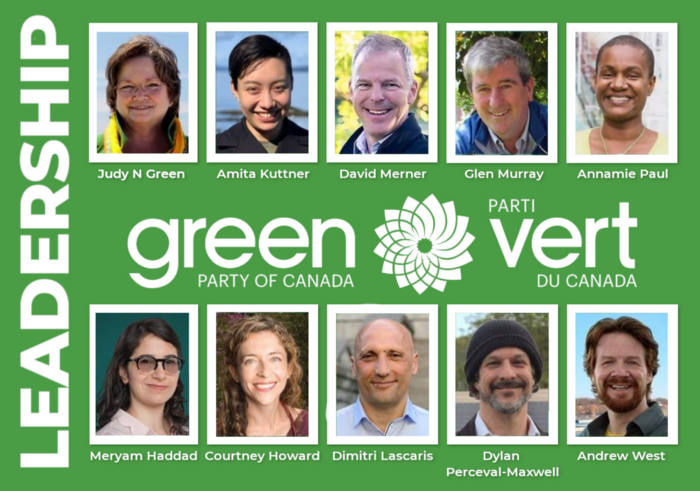Here’s what they had to say in response to a question specific to Simcoe North
In the 2020 race to replace Elizabeth May as leader, the federal Green Party was lucky to have a wealth of diverse and talented candidates throw their hats into the ring. While the global pandemic put a damper on the candidates ability to travel around the country and meet party members and address them in person, technology stepped up and as has become the way of the covid age, Zoom replaced physical space. Through the diligent work of Catherine Jones, Financial Agent for the GPC in the riding of Barrie-Innisfil, each of the candidates were contacted and arrangements made to hold a digitally mediated ‘townhall meeting’ specifically for the ridings in and around Simcoe County. Beginning in June of 2020 and going on into August, individual members could hear the candidates discuss their views and vision for the party and members were able and encouraged to ask questions related to their own interests.

As a way of gauging how these candidates could confront the issues unique to the riding of Simcoe North, in addition to fielding questions from members of Simcoe EDAs, each candidate was asked the following question:
Starting with a preamble that introduced the expansion of the Teedon pit and the consequent threat to the Alliston aquifer as well as issues of illegal soil dumping throughout the riding of Simcoe North, the candidates were asked “that since the main stressors to the ecology of Simcoe North are imported from a rapidly expanding GTA, what is your own personal position on this and how do you think the party can help ridings like ours mitigate the more dire consequences associated with this level of unsustainable growth?”
Below are summaries of the unique and varied responses provided by each candidate in the order they came to ‘visit’ us:
Annamie Paul- Paul recognised the threat urban growth has had on surrounding districts and maintained that population densities of large cities mitigated use of both space and resources compared to non-urban areas. She noted that non-urbanites used more resources in everything from land to fuel for example, because they often need to drive even for basic daily necessities.
To tackle the problem, she emphasised a need not only for strict regulations but also for equally strict enforcement to protect the resource bases and make sure they are sustainably sourced for generations to come.
Amita Kuttner- Kuttner’s response indicated they were acutely aware of the kind of pressure imposed on regions surrounding large growing urban centres.
Kuttner suggested incentives to use construction material that had less impact ecologically even if they are more expensive to source. As a ‘leftist libertarian’, Kuttner seemed to emphasise these kinds of incentivised pathways over legislated law and order solutions.
Glen Murray- Murray identified the problem with population growth and expressed an ability to mitigate the problem by spreading the population out. Murray noted that a number of Canadian cities — like Winnipeg where he served as mayor — have heightened capacities through infrastructure development to accommodate a projected population beyond its current numbers.
Murray felt these cities could absorb more population to take the stress off the centres that are already beyond capacity like Toronto, Montreal, and Vancouver.
Meryam Haddad- Haddad didn’t spend much time on the question and didn’t address the issue of growth. Regarding the sample issues tied to the growth problem, her brief response to the threat to the Alliston aquifer was to state that “Canada doesn’t have a water problem.”
Andrew West- West expressed significant interest in the sample issues and asked for many more details. Whether this was tied to population growth through immigration or not, West emphasised that “no topic be too dangerous to discuss”.
While acknowledging that it sounded to him like more of a provincial level issue than a federal, he emphasised that his own platform prioritises the need to protect our water sources wherever they are under threat in Canada.
David Merner- Merner also identified population growth as quintessential to the problem of growth. He further acknowledged that as Canada has a population growth rate that barely replenishes its current population, growth with regard to population is a question of immigration. He stated that Canada has a “moral and humanitarian responsibility” to take on refugees and especially the growing numbers of people displaced by climate catastrophes around the world.
In order to accommodate these new Canadians, Merner wants ways that minimise the impact to the environment become important parts of the national conversation.
Courtney Howard- While Howard also immediately identified the problems as crossing jurisdictional powers, Howard then cited examples in various areas where different levels of government successfully worked together and supported each other toward a common goal of community ecological protection. She noted, however, that the provincial government seems to have an agenda different from local council and that makes cooperation difficult.
To deal with this, Howard emphasises the importance of shedding light on the issues to the voters affected by the fallout of poorly thought out ecological decisions and make sure to elect leaders who emphasise the importance of the ecological health of the planet.
These answers were both thoughtful and reflective of the great talent pool this leadership race has attracted. Many thanks to the leadership candidates for taking the time to ‘visit’ and hopefully the responses here will help guide members in choosing the leader they feel best reflects the Green values as those values are reflecting issues specific to the riding of Simcoe North.
Voting begins on September 26th and closes on October 3rd. The deadline to join the party in order to be eligible to vote September 3rd, 2020.

